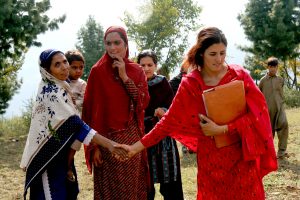Women’s rights activists who organized this year’s International Women’s Day in Pakistan have been accused of committing blasphemy and received death threats from extremist groups in the country. Following the spread of fake material, the Pakistani Taliban, also known as the Tehree-e-Taliban Pakistan (TTP), told the organizers of the march that “Fix your ways, there are still many young Muslims here who know how to protect Islam and the boundaries set by Allah.”
The spread of fake videos and images on social media suggesting that the organizers of the march had insulted Islam also found attention of the country’s courts. On March 26, a local court in Pakistan ordered the registration of a first information report (FIR) against the planners of the March for allegedly making “derogatory remarks” against Islam.
This happened even after the organizers issued clarifications that the participants did not raise blasphemous slogans and their materials were edited to defame their movement. Women’s rights present a miserable picture in Pakistan. In 2020, the country was ranked at 151 out of 153 countries in the Global Gender Gap Index.
The events around this year’s Women’s Day march highlight a troubling trend of how disinformation is used to discredit marginalized communities in Pakistan. In the past, this has happened in the case of different minority ethnic groups but now we are seeing the same tactics being used against women as a distinct identity group. “I do believe this was very deliberate,” said Farieha Aziz, who is a women rights activist about the vilification campaign against the march organizers. She further notes that “[t]his time it took on a more dangerous dimension,” because of “the assertion that anti-Islam and blasphemous activities have taken place.”
However, this is not how a women’s march should be described or allowed to be propagated in a society where women rights already present a dismal picture. Shenila Khoja-Moolji, a professor of women’s studies told the The Diplomat “the Aurat March is ultimately an effort by women to claim public space and advance their demands related to economic, reproductive, and environmental justice, which influence their wellbeing.”
Khoja-Moolji notes that “in doing so, protestors mobilize meanings of ‘good life’ and gender roles and relations, that produce anxieties in other publics who seek to control and regulate women.”
However, Khoja-Moolji cautions that we should not reduce this to a liberal/Western and Islamic/Eastern binary, the way that those who are levying blasphemy charges against the organizers of the Aurat March are doing. “In fact, demands for gender justice can be completely congruent with Islamic teachings on social justice and equality. So, what we are seeing in the blasphemy accusations is an instrumentalization of Islam to regulate women,” Khoja-Moolji asserts.
Unfortunately, this year’s events do not mark a turning point in the fight for women’s rights in the country. Not to say that there haven’t been huge uphill battles in the past, particularly during the Zia ul Haq regime, but the intersection of violent extremist groups, misinformation and social media, and recent examples of vigilante justice raise the stakes of what is happening today. The struggle in this regard becomes further complicated when a country’s prime minister suggests women’s way of dressing as a reason for rise in rape cases. Last week, Prime Minster Imran Khan in a statement said that an increase in rapes indicated the “consequences in any society where vulgarity is on the rise.”
Khan advised women to cover up to evade temptation. “This entire concept of purdah is to avoid temptation, not everyone has the willpower to avoid it,” Khan said.
If Khan considers women’s dress a reason for rising rape cases, it should not come as a surprise that TTP would want to jump on the same morality bandwagon to win support of the mostly conservative Pakistani population. While the ideological basis of TTP’s disagreement with the march is not surprising, the group’s decision to explicitly and vocally condemn the movement perhaps signals a shift in their perceived spheres of interest.
TTP’s “threats should raise alarm bells for security agencies. These threats are meant to create fear and gain the sympathy of radical segments only to create hurdles for the people who want to raise their voice for women’s rights,” Mahnoor Shaikh, a women rights activist told The Diplomat.
As it appears, Pakistan’s women should be worried about militant groups like TTP, the county’s judiciary, and its prime minister before they start thinking about asking for their fundamental human rights.

































